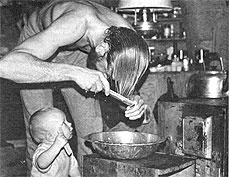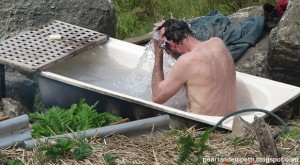Living life off the grid comes with all kinds of challenges, some you may be ready for and others that never occurred to you until they arise. For many, hygiene falls into the latter category. Having easy access to soaps, shampoos, toothpaste, and other modern hygiene conveniences is something that most of us take for granted.
While hygiene may seem like a delicate subject, or one to giggle about, it is serious business. If you are living off the grid keeping yourself and your family clean is a matter of health. Without good hygiene, you can easily pass illnesses around and put yourselves at risk of contracting serious diseases. There are ways, though, that you can maintain good hygiene and good health whether you are off the grid, prepping, or getting into prepping mode.
Plan Your Stockpiles
Every prepper and off the grid homesteader knows the importance of good planning and preparation. Before disaster strikes, be sure you have included hygiene on your prepping list. Start your planning for hygiene and health care with the stocking of supplies.
Make a list of what you use to maintain good hygiene and start collecting. This may include soap, shampoo, deodorant, hand sanitizer, wet wipes, tampons, and any number of other supplies you use on a regular basis and find you can’t live without.
If you need to scale back because your storage space is limited, leave out those items that are not necessary for health and safety. For instance, you can live with a dual soap/shampoo and without conditioner and deodorant. Do not leave out things like soap, sanitizer, and first aid supplies, however.
Ensure Clean Water
Having a steady supply of clean water is perhaps the most important aspect of off the grid living, and an essential factor in maintaining good hygiene. Before you finalize any plans for going off grid, be sure you have water sorted, and plan for more than one source. Start by having a plan to store clean water for immediate needs during a crisis. This could mean stocking up on bottled water and collecting water in your bathtub.
For the long-term, a well is ideal. If you are making a move, find a location in which you can dig a well for your own personal use. Living near a stream is a good back up, but a well is better. Even if you have a well or other water supply, use rain barrels too. The more water you have, the better you will be able to keep things clean. If you have to be stingy with your water supply because you don’t have enough, hygiene, and as a result your health, will suffer.
The Bathroom
Doing your business off the grid can be messy and dangerous. If you have working plumbing and your own septic system, lucky you! If not, you have a few options. The key to going number two without indoor plumbing is to keep it sanitary.
If you dig a pit toilet, keep sawdust on hand so that everyone can cover up after their turn at the pit. Lime can also be sprinkled in the pit to keep it sanitary. If you have toilets, but no running water, you can still use them as long as your water supply is plentiful. Just dump enough water in the bowl to flush the waste down.
As for toilet paper, you can stock up ahead of time, but eventually you may run out. Any kind of paper will work, but so will leaves. Just be sure to avoid poison ivy. Make sure everyone in the household understands the importance of hand washing after every single bathroom use. If you have no running water, sanitary wipes or alcohol-based sanitizer are good alternatives.
Getting Clean
 As long as you have enough water, keeping clean will be possible for you. It may not be as easy as taking a shower or running the dishwasher, but it will be doable. If you have a pond or river nearby, you can bathe there with natural, biodegradable soaps.
As long as you have enough water, keeping clean will be possible for you. It may not be as easy as taking a shower or running the dishwasher, but it will be doable. If you have a pond or river nearby, you can bathe there with natural, biodegradable soaps.
If not, you can use a camp shower to get clean. Also known as solar showers, you simply fill the bladder with water, hang it from a tree branch and let the sun warm it. Open the nozzle and you have a warm, outdoor shower.
Cleaning dishes and eating utensils is serious business when you’re living off grid. Dishwashers are great at sanitizing and we take that for granted. When washing your dishes, heat up water, use soap, and rinse in a light bleach solution if possible. The latter is particularly important if you are living with a large group of people.
Miscellaneous
There are many other things to consider when maintaining good hygiene off the grid. For instance, don’t get lazy about your teeth. Getting dental care may not be possible, so prevent any problems by brushing and flossing every day. If you run out of toothpaste, use baking soda, or even salt to scrub and then rinse. Long before toothpaste, people chewed sticks and it works.
Use something fragrant to freshen your breath and clean out bits of food at the same time.
For menstrual cycles, stock up on tampons and sanitary napkins. These will not last forever, though, so for a long-term solution, look into reusable rubber cups. These can be inserted to catch the blood and used again and again for years. Wash thoroughly after each use and when not needed, store it in a dry, sealed container to keep it clean. Keep a small supply on hand, just in case.
Finally, as you plan and prepare for a disaster or for going off grid, stock up on wet wipes, both anti-bacterial and regular. These are invaluable items when it comes to convenient hygiene. If you have the storage space, keep plenty on hand for hand washing, face washing, a refresher between bathing, and for disinfecting. With good planning and preparation, and an eye for hygiene, you can maintain a sense of cleanliness and good health even when disaster strikes.
Source:Survivopedia.com

Leave a Reply